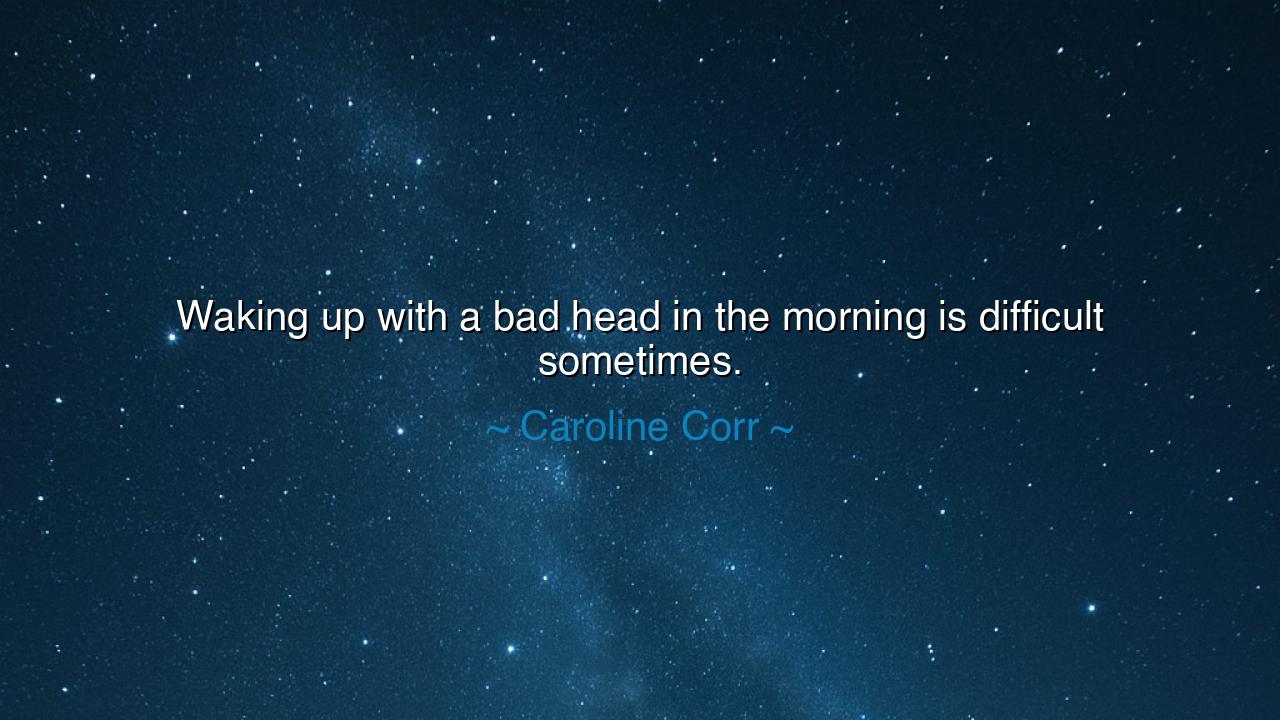
Waking up with a bad head in the morning is difficult sometimes.






When Caroline Corr admitted, “Waking up with a bad head in the morning is difficult sometimes,” she voiced a truth that is as old as humanity itself: the fragility of the body and the weight of fatigue can become barriers to joy and purpose. Though her words may seem simple, they reveal a universal struggle—the challenge of rising to face the day when one’s strength feels diminished, when the mind is clouded, or when burdens of the past night linger into dawn.
The origin of this quote rests in her life as both musician and performer, a life filled with long nights, demanding schedules, and the exhaustion that follows. For Caroline Corr, as for many artists, mornings did not always begin with radiant energy but sometimes with the heaviness of fatigue. Yet her honesty teaches us something profound: greatness does not come from pretending to be invincible, but from acknowledging the weakness of flesh while still choosing to rise again.
History is rich with examples of this battle against weariness. Churchill, in the darkest days of war, would confess that the weight of responsibility sometimes made mornings feel unbearable—but he rose nonetheless, because the hour demanded courage. Beethoven, plagued by deafness and illness, often faced mornings of despair, yet sat at his piano to wrestle with destiny through sound. These figures remind us that the struggle of a heavy morning is not a shameful weakness, but part of the human condition that even the greatest must endure.
There is also in her words a reminder of humility. We live in an age that glorifies unending productivity, where to be weary is seen as failure. Yet Corr’s statement breaks through this illusion. To say “it is difficult” is not defeat—it is truth. And truth is the ground upon which resilience is built. For it is not in denying difficulty that we grow strong, but in facing it honestly and still taking the next step forward.
Her words also invite us to consider the renewing power of mornings. Even with a “bad head,” each dawn is a chance to reset, to rise, and to face anew the unfolding story of life. The morning may come burdened with discomfort, but it also brings light, possibility, and the chance to turn struggle into perseverance. Thus, each difficult awakening is not only a trial, but also an opportunity for victory over self.
The lesson for us is clear: strength is not the absence of struggle, but the choice to rise despite it. If you wake with heaviness, take it not as a sign of defeat, but as the common lot of humankind. Learn to greet the morning with patience, with kindness toward yourself, and with courage to begin again. Each day, no matter how clouded, carries within it the potential for renewal.
So let us hold close Caroline Corr’s humble admission: “Waking up with a bad head… is difficult sometimes.” May it remind us that weakness is not the end of the story, but the beginning of resilience. Let us rise, even if slowly, even if with difficulty, and claim the day as our own. For it is not the perfection of mornings that defines us, but the courage to live them fully, even when they begin in struggle.






AAdministratorAdministrator
Welcome, honored guests. Please leave a comment, we will respond soon